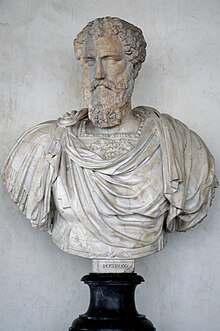| Pertinax | |||||||||
|---|---|---|---|---|---|---|---|---|---|
 Bust, Galleria degli Uffizi, Florence[1] | |||||||||
| Roman emperor | |||||||||
| Reign | 1 January 193 – 28 March 193 | ||||||||
| Predecessor | Commodus | ||||||||
| Successor | Didius Julianus | ||||||||
| Born | 1 August 126 Alba Pompeia, Italy | ||||||||
| Died | 28 March 193 (aged 66) Rome, Italy | ||||||||
| Burial | Rome | ||||||||
| Spouse | Flavia Titiana | ||||||||
| Issue | |||||||||
| |||||||||
| Father | Helvius Successus | ||||||||
| Roman imperial dynasties | ||
|---|---|---|
| Year of the Five Emperors (AD 193) | ||
| Chronology | ||
|
193 |
||
|
193 |
||
|
193–194 |
||
|
193–197 |
||
|
193–211 |
||
| Succession | ||
|
||
Publius Helvius Pertinax (/ˈpɜːrtɪnæks/ PER-tin-ax; 1 August 126 – 28 March 193) was Roman emperor for the first three months of 193. He succeeded Commodus to become the first emperor during the tumultuous Year of the Five Emperors.
Born to the son of a freed slave, Pertinax became an officer in the army. He fought in the Roman–Parthian War of 161–166, where his success led to higher positions in both the military and political spheres. He achieved the rank of provincial governor and urban prefect. He was a member of the Roman Senate, serving at the same time as the historian Cassius Dio.
Following the death of Commodus, Pertinax was proclaimed emperor. He instituted several short-lived reform measures, including the restoration of discipline among the Praetorian Guard. This led to resistance that culminated in Pertinax's assassination by the Guard. Pertinax would later be deified by the emperor Septimius Severus. His historical reputation has been largely positive, in line with Cassius Dio's assessment.
- ^ Pertinax Inv. 1914 n. 202. Uffizi Digitization Project.
- ^ Inscriptiones Latinae Selectae 5842, 5845.
- ^ Elliott, Simon (2020). Pertinax: The Son of a Slave Who Became Roman Emperor. Greenhill Books. p. 115. ISBN 978-1-78438-526-2.
- ^ Cooley, Alison E. (2012). The Cambridge Manual of Latin Epigraphy. Cambridge University Press. p. 494. ISBN 978-0-521-84026-2.